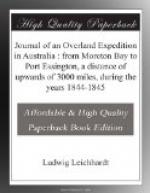Oct. 22.—We travelled about seven miles to the westward, when we came to a broad creek, which compelled us to go five miles to the southward in order to cross it. The country was still a succession of box-flats along the river, with rocky barren ranges in the distance; the latter, however, approached so near the creek, that we found it difficult to pass along. About two miles and a-half from our last camp, we had to cross a running Casuarina brook, which, though very small, was so boggy, that two of our horses were again in great danger of being lost.
Last night we heard the calls of natives at the opposite side of the river. As soon as they saw us, they crossed the river, and came pretty close to us: the discharge of our guns, however, kept them at a distance. Several of our party, during their watches saw them moving with fire sticks on the other side of the river. In the morning, three of them came boldly up; so I went to them with some presents, and they became very friendly indeed. Presents were exchanged; and they invited us in the most pressing manner to accompany them to their camp; and were evidently disappointed in finding that we could not swim. I gave them horse-nails, and they asked me to bend them into fish-hooks. They had doubtless seen or heard of white people before; but of our horses and bullocks they were much afraid, and asked me whether they could bite: they accompanied me, however, pretty near to the camp; but kept their arms round my waist, to be sure of not being bitten. As we proceeded on our journey, they followed us for a long distance, and offered Charley and Brown a gin, if we would go to their camp. They were circumcised, and two front teeth had been knocked out; they had horizontal scars on their chests.
A great number of flying-foxes (Pteropus) were in the river brush, and Brown shot three of them.
The days were cloudless and very hot; the east wind was strong during the afternoon; the nights very cool and pleasant, but without dew.
Oct. 23.—This morning, our sable friends came again to our camp; they made their approach known by a slight whistling. We invited them to come nearer, and many new faces were introduced to us. Of three young people, one was called “Gnangball,” the other “Odall,” and a boy “Nmamball.” These three names were given to many others, and probably distinguished three different tribes or families. We gave them sheets of paper on which the figures of kangaroos, emus, and fish were drawn. When we were loading our bullocks, a whole mob came up with great noise; and one of them danced and jumped about with incessant vociferations, flourishing his wommerah, crowned with a tuft of opossum’s hair, like a Drum-major; I put a broken girth round his waist, which seemed to tranquillize him wonderfully. In drinking water out of my pot, I offered it to my friend; but he hesitated to follow my example, until he applied to an elderly, bearded, serious-looking




